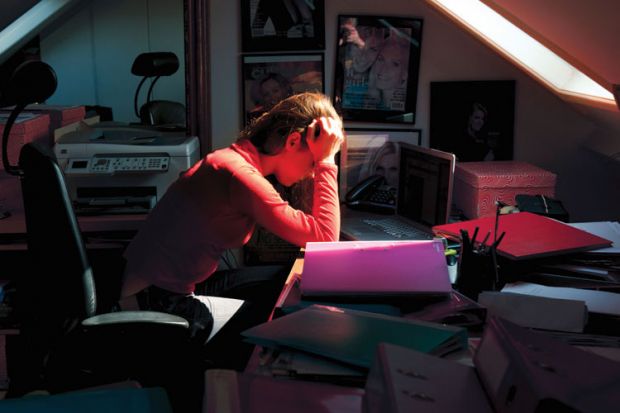Source: Alamy
Symptoms: feeling overwhelmed, tearful and irritable are signs of stress
A PhD can sound like a great career move: it challenges the intellect, expands horizons, boosts a CV and offers flexible working hours. But for some the nature of the work involved can take a toll on their mental health.
This may be partly down to the fact that PhD students often have lots of unstructured time to work alone on a research project that, inevitably, does not always go to plan.
Dealing with the fallout when things go awry can be overwhelming, said Rosanna Hardwick, charity and communications manager for mental health organisation Student Minds.
“It can be really important to take time away from the lab or the library to get some perspective and chat to family members and friends,” she told Times Higher Education, adding that students should keep up with creative activities, sports and societies to relieve some of the pressure.
“PhD students might have a lot of unstructured time so it is quite easy to blur the lines between your personal life and your work life, and start working into the evenings and at weekends,” she said. This can lead to students feeling guilty about taking time out for themselves, she added.
Ms Hardwick offered some healthy habits that students can put in place to make sure they look after themselves.
They should set up a personal routine to help to structure their days and schedule in some downtime so that they have something to look forward to. “It might be going for a walk or going to a local café for breakfast,” she suggested. Making sure that time is set aside for a “proper lunch break” should also be a priority, she said.
“Make the most of your evenings and weekends…try to have regular commitments that you make time for every week, [such as] a society or sports club, so that you are not tempted to stop taking time off when it gets busy as it inevitably will at some point,” she explained.
She also suggested setting “small achievable goals” for work to help with motivation, while changing your surroundings can also help if working in one place gets too intense.
General signs of stress to look out for are feeling overwhelmed, tearful and irritable. While working, alarm bells should ring if you experience poor concentration and difficulty focusing. Losing interest in life, having low energy levels and irregular sleeping patterns, meanwhile, are signs of depression.
Ms Hardwick was clear that if someone is experiencing signs of faltering mental health they should make an appointment with their GP or university counsellor to discuss their feelings. Encourage a friend to make an appointment if you are worried about them, she added.
Supervisors also have a part to play in helping to protect the mental health of students, she said. “If you [as a supervisor] are concerned, then mention that. Often it is good to have an awareness of what support services are at the university so that you can signpost [them] to those [students who might need them],” she said.
Ms Hardwick said that many self-help guides for students were also available online on the Student Minds website and on that of another campaign, Students Against Depression.
Appointments
The University of Lincoln has announced three appointments. Paul Squires and Claire Hills have joined the School of Life Sciences from the University of Warwick to continue their joint research into better understanding the sub-cellular mechanisms that regulate how people with diabetes can end up with diabetic nephropathy (kidney disease).
Stuart Humphries, who will be a senior figure in the school’s evolution and ecology research group, has joined as professor in evolutionary bio-physics.
Panos Koutrakos, professor of European Union law at City University London’s law school, has been awarded a Jean Monnet chair in EU law by the European Commission. The chair is given in recognition of excellence in the field of European Law.
The University of Oxford has made two appointments: Horst Eidenmüller, director of the Munich Centre for Dispute Resolution and the Institute of International Law at Munich University, has been appointed to the Freshfields professorship of commercial law. (He already held a visiting professorship at Oxford.) And Henrike Lähnemann, chair of German studies at Newcastle University, has been made professor of German medieval and linguistic studies. Both take up their positions on 1 January 2015.





